Unit 14 I remember meeting all of you in Grade 7. 知识点课件(共37张PPT) 2024-2025学年人教版九年级全册
文档属性
| 名称 | Unit 14 I remember meeting all of you in Grade 7. 知识点课件(共37张PPT) 2024-2025学年人教版九年级全册 |
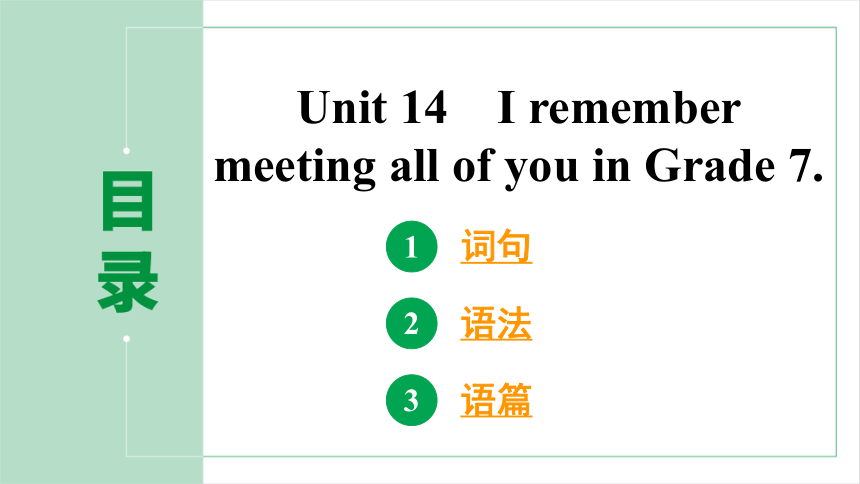
|
|
| 格式 | pptx | ||
| 文件大小 | 2.5MB | ||
| 资源类型 | 教案 | ||
| 版本资源 | 人教新目标(Go for it)版 | ||
| 科目 | 英语 | ||
| 更新时间 | 2024-11-27 20:41:38 | ||
图片预览

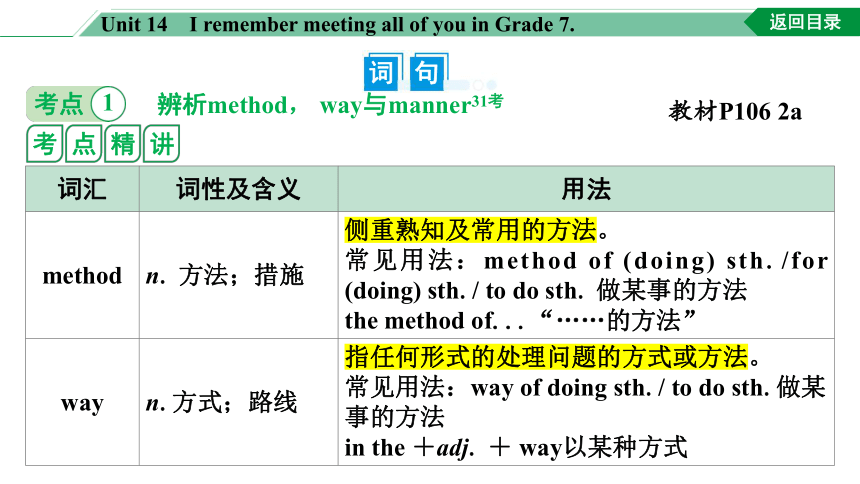
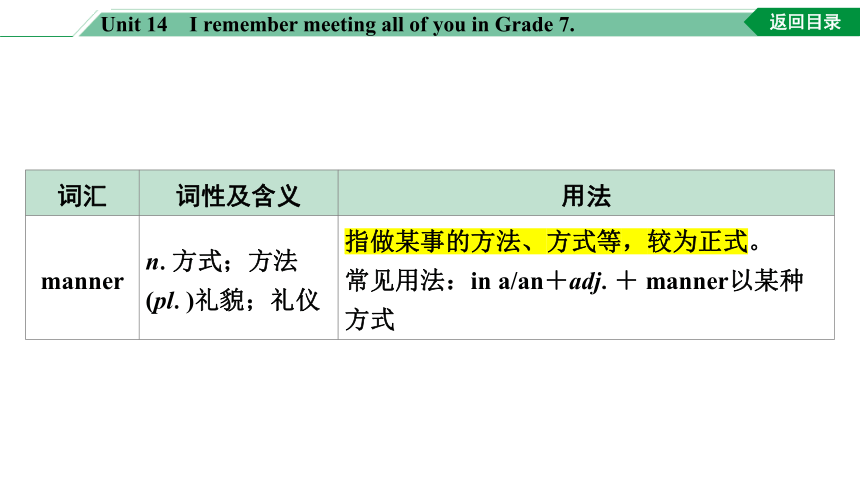
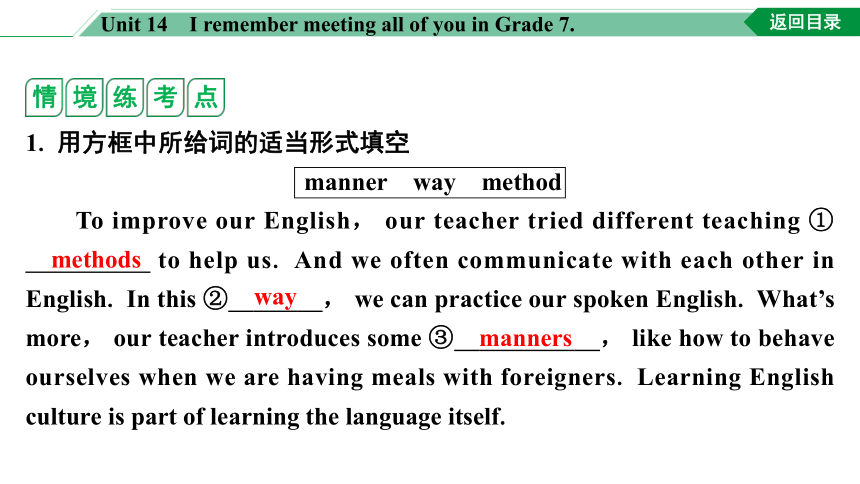
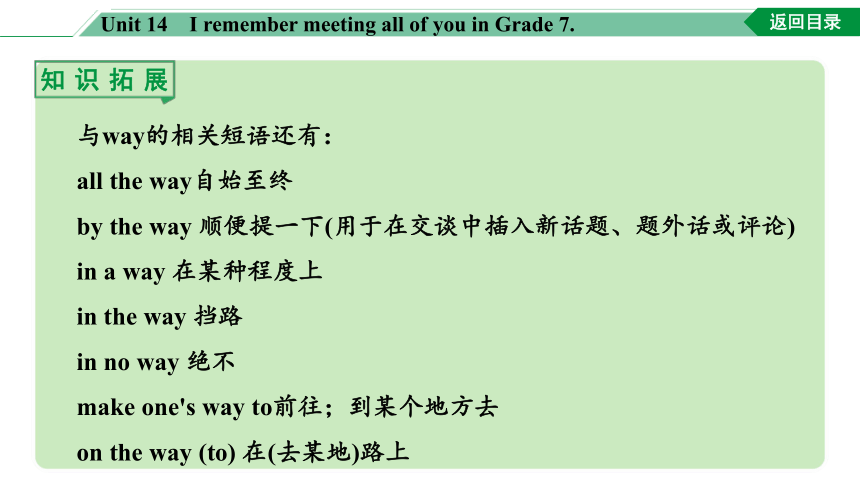
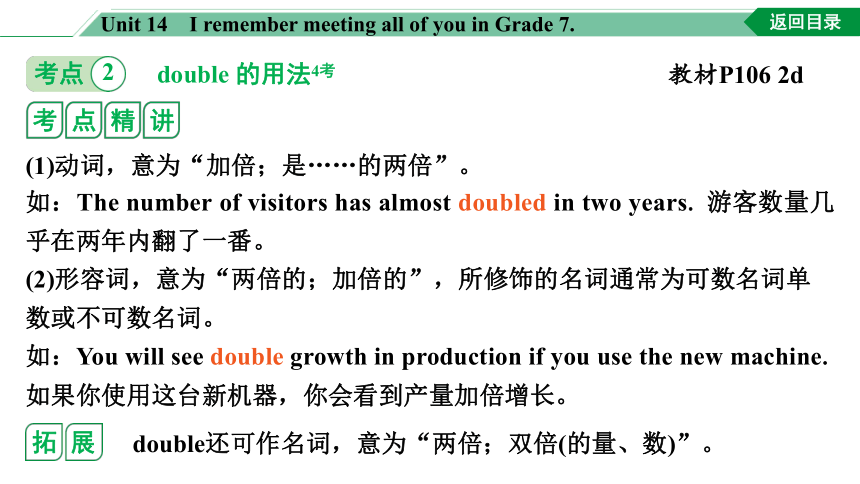
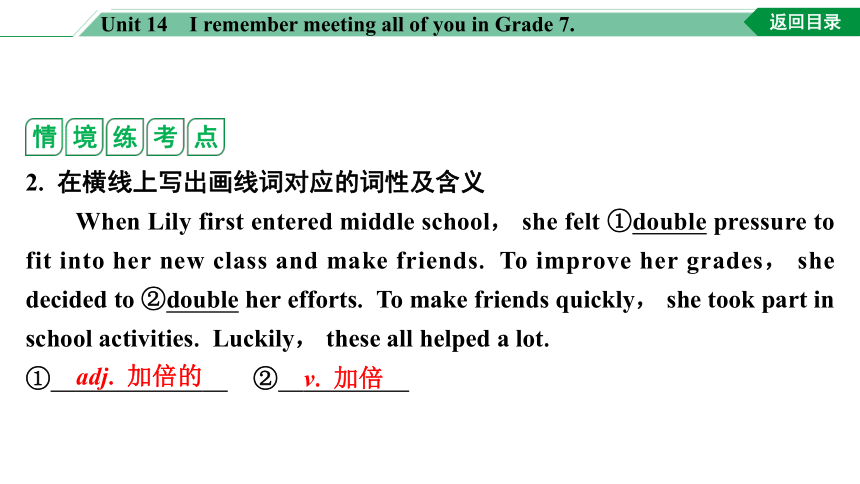
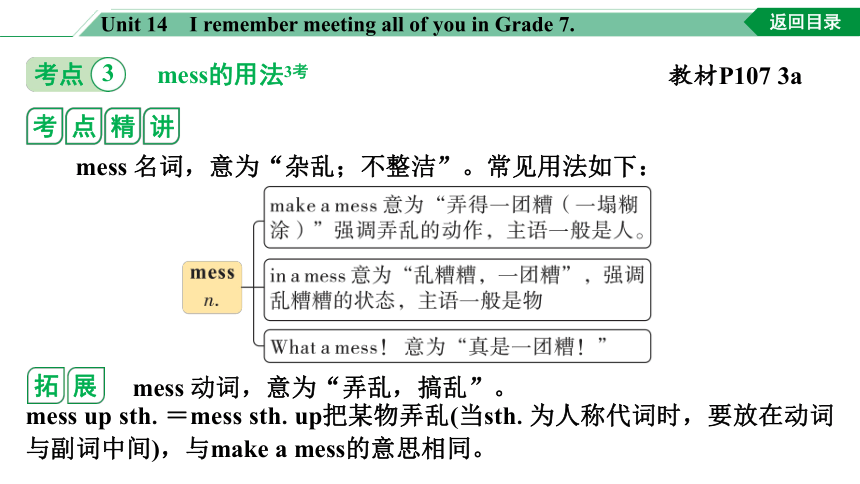
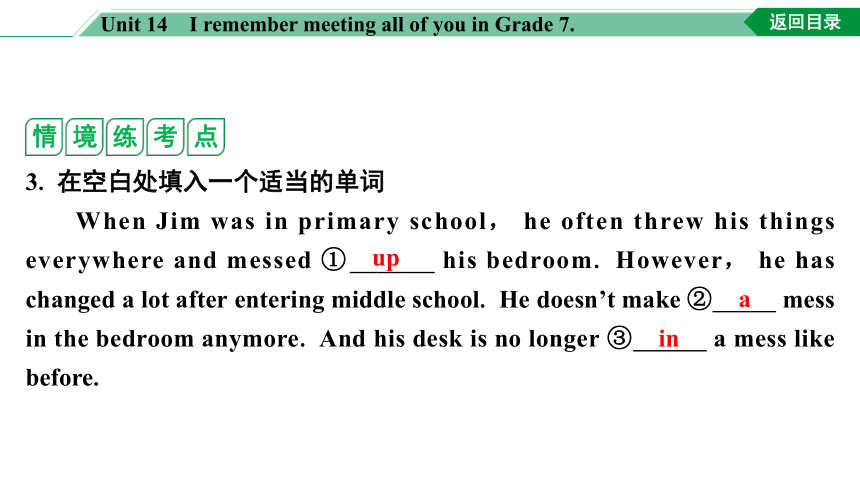
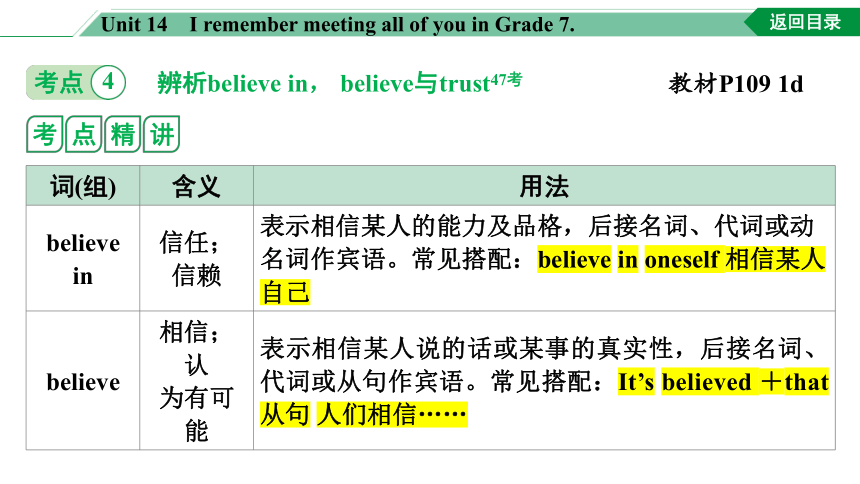
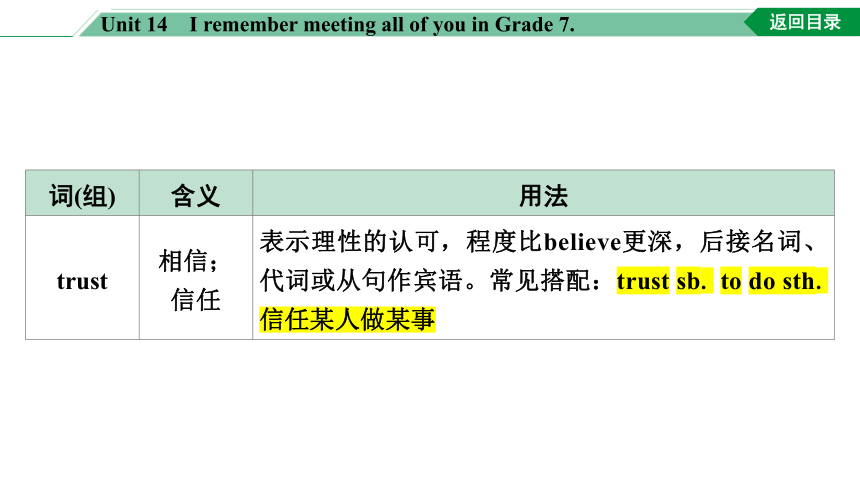
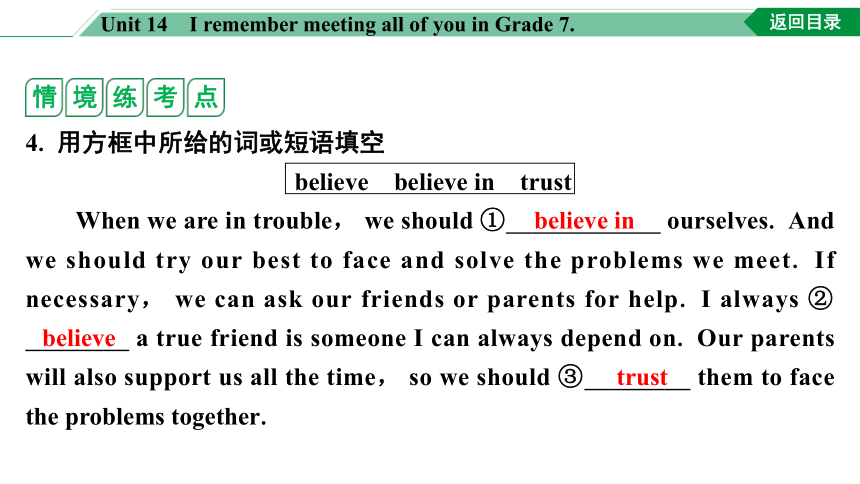
文档简介
(共37张PPT)
Unit 14 I remember meeting all of you in Grade 7.
语法
2
词句
1
语篇
3
词句
辨析method, way与manner31考
考点
1
考点精讲
教材P106 2a
词汇 词性及含义 用法
method n. 方法;措施 侧重熟知及常用的方法。
常见用法:method of (doing) sth./for (doing) sth./ to do sth. 做某事的方法
the method of...“……的方法”
way n.方式;路线 指任何形式的处理问题的方式或方法。
常见用法:way of doing sth./ to do sth.做某事的方法
in the +adj. + way以某种方式
词汇 词性及含义 用法
manner n.方式;方法 (pl.)礼貌;礼仪 指做某事的方法、方式等,较为正式。
常见用法:in a/an+adj.+ manner以某种方式
情境练考点
1. 用方框中所给词的适当形式填空
manner way method
To improve our English, our teacher tried different teaching ① methods to help us. And we often communicate with each other in English. In this ② way , we can practice our spoken English. What’s more, our teacher introduces some ③ manners , like how to behave ourselves when we are having meals with foreigners. Learning English culture is part of learning the language itself.
methods
way
manners
与way的相关短语还有:
all the way自始至终
by the way 顺便提一下(用于在交谈中插入新话题、题外话或评论)
in a way 在某种程度上
in the way 挡路
in no way 绝不
make one's way to前往;到某个地方去
on the way (to) 在(去某地)路上
知识拓展
double 的用法4考
考点
2
考点精讲
(1)动词,意为“加倍;是……的两倍”。
如:The number of visitors has almost doubled in two years. 游客数量几乎在两年内翻了一番。
(2)形容词,意为“两倍的;加倍的”,所修饰的名词通常为可数名词单数或不可数名词。
如:You will see double growth in production if you use the new machine.如果你使用这台新机器,你会看到产量加倍增长。
double还可作名词,意为“两倍;双倍(的量、数)”。
拓展
教材P106 2d
情境练考点
2. 在横线上写出画线词对应的词性及含义
When Lily first entered middle school, she felt ①double pressure to fit into her new class and make friends. To improve her grades, she decided to ②double her efforts. To make friends quickly, she took part in school activities. Luckily, these all helped a lot.
① adj. 加倍的 ② v. 加倍
adj. 加倍的
v. 加倍
mess的用法3考
考点
3
考点精讲
mess 名词,意为“杂乱;不整洁”。常见用法如下:
mess 动词,意为“弄乱,搞乱”。
拓展
mess up sth.=mess sth.up把某物弄乱(当sth.为人称代词时,要放在动词与副词中间),与make a mess的意思相同。
教材P107 3a
情境练考点
3. 在空白处填入一个适当的单词
When Jim was in primary school, he often threw his things everywhere and messed ① up his bedroom. However, he has changed a lot after entering middle school. He doesn’t make ② a mess in the bedroom anymore. And his desk is no longer ③ in a mess like before.
up
a
in
辨析believe in, believe与trust47考
考点
4
考点精讲
词(组) 含义 用法
believe in 信任;信赖 表示相信某人的能力及品格,后接名词、代词或动名词作宾语。常见搭配:believe in oneself 相信某人自己
believe 相信;认 为有可能 表示相信某人说的话或某事的真实性,后接名词、代词或从句作宾语。常见搭配:It’s believed +that从句 人们相信……
教材P109 1d
词(组) 含义 用法
trust 相信;信任 表示理性的认可,程度比believe更深,后接名词、代词或从句作宾语。常见搭配:trust sb. to do sth.信任某人做某事
情境练考点
4. 用方框中所给的词或短语填空
believe believe in trust
When we are in trouble, we should ① believe in ourselves. And we should try our best to face and solve the problems we meet. If necessary, we can ask our friends or parents for help. I always ② believe a true friend is someone I can always depend on. Our parents will also support us all the time, so we should ③ trust them to face the problems together.
believe in
believe
trust
辨析task, work与job44考
考点
5
考点精讲
词汇 词性及含义 用法
task n.任务;工作 可数名词,多指有难度的任务或工作
work n.工作 不可数名词,指人们日常生活和工作中所从事的有目的的体力或脑力劳动
job n.工作;职业 多指为换取报酬而进行的活动,尤指某一行业的工作或职业
教材P110 2b
如:When you are given a difficult task, try to stick with it and finish it.当你被赋予一项艰巨的任务时,试着坚持下去并完成它。
Students can think about what work they want to do in the future at an early age.学生可以在很小的时候就思考自己将来想做什么工作。
Lily took a job as a doctor. Lily找了一份医生的工作。
情境练考点
5. 用方框中所给词的适当形式填空
work task job
On the first day of junior high school, the teacher gave a ① task to the class.
The students should be in groups and create a project about their dream ② jobs . The students were all interested in it, and they couldn’t wait to start it.
task
jobs
As they ③ worked together, they helped each other find out what they liked to do. And they tested what ④ work/jobs they might be good at. They also learned about the differences among different ⑤ jobs .
At the end of the project, the students were all looking forward to their future.
worked
work/jobs
jobs
separate 的用法16考
考点
6
考点精讲
separate可作形容词,意为“单独的;分离的”;也可作动词,意为“分开;分离”。常见用法如下:
如:separate bedrooms 独立的卧室
教材P110 2b
辨析separate 和divide
拓展
图解助记
情境练考点
6. 根据汉语提示填空
The time to get together is always short. It was sad to ① be separated from (被分离) my lovely classmates at middle school. I often miss them and the math class in middle school. At that time, Mrs. White often ② divided us into (将我们分成) several groups when we needed to work together in class. Everyone made his or her efforts to achieve one goal.
be
separated from
divided us into
辨析journey, trip, tour与travel9考
考点
7
考点精讲
词汇 词性及含义 用法
journey n.旅行;行程 可数名词,尤指长途旅行,也可指抽象的旅途,如人生与心灵的历程。
trip n.旅游;旅行 可数名词,多指带有特殊目的或定期的较短距离的旅游或远足,尤指带有娱乐性的旅行。
tour n.& v.旅行;旅游 可数名词,多指为娱乐而旅行,有组织地参观某地及其风景。
travel n.& v.旅行;游历 不可数名词,多指旅行的行为或活动。
教材P110 2b
情境练考点
7. 用方框中所给的词填空
tour trip journey travel
Last year, Alex started the new ① journey of his life—he entered middle school. Alex’s parents took him on a ② trip to Hainan. Before going there, they booked a ③ tour to learn more about its culture and history. In Hainan, they met people who like to ④ travel all over the world. Alex also tried some new foods, and even learned about the local customs.
journey
trip
tour
travel
语法
复习一般现在时127考、一般过去时271考与一般将来时88考
知识点
1
语法精讲
1. 一般现在时
(1)概念:表示现阶段经常发生的、习惯性的动作或存在的状态和客观真理。
(2)肯定句式:主语+am/is/are +其他.或主语+动词原形/动词单三形式+其他.
否定句式:主语+am/is/are+not+其他.或主语+don’t/doesn’t +动词原形+其他.
一般疑问句式:Am/Is/Are+主语+其他?或Do /Does+主语+动词原形+其他?
(3)常见时间状语:often, seldom, every day/week/month, once a year等。
一般现在表经常,时间状语记心上;
主从复合不寻常,主将从现不能忘。
口诀助记
2. 一般过去时
(1)概念: 表示过去某个时间所发生的动作或存在的状态。
(2)肯定句式:主语+was/were+其他.或主语+动词过去式+其他.
否定句式:主语+was/were+not+其他.或主语+didn’t+动词原形+其他.
一般疑问句式:Was/Were+主语+其他?或Did+主语+动词原形+其他?
(3)常见时间状语:ago, yesterday, in the past, just now, last词组,in+过去时间等。
3. 一般将来时
(1)概念:表示将来某个时间将要发生的动作或存在的状态。
(2)肯定句式:主语+will/be going to+动词原形+其他.
否定句式:主语+won’t/be not going to+ 动词原形+其他.
一般疑问句式:Will+主语+动词原形+其他?或Be+主语+going to+动词原形+其他?
(3)常见时间状语:tomorrow, soon, in the future, next week/month, in +一段时间, some day等。
一般将来将发生,两种结构要牢记;
位移动词特殊性,将来要用be doing。
口诀助记
情境练语法
8. 用方框中所给词的适当形式填空
come want smile continue meet
I am Karl, from Class 3. I ① want to share my experiences in middle school with you. When I first ② came to our school, I was surprised at the large school. The first teacher I ③ met was Miss Li. She stood in front of the door of the classroom and ④ smiled at every student. My classmates were all friendly and nice. I was happy to be with them. And I hope that we ⑤ will continue to help each other and make progress together in the coming years.
want
came
met
smiled
will continue
9. 用所给词的适当形式填空
In the past three years of middle school life, I ① have grown (grow) a lot. I used to be shy, but now I ② am (be) more outgoing. I once ③ joined (join) our school basketball team, so I can play it well now. These days, I ④ am preparing/have been preparing (prepare) for my senior high school entrance exam.
have grown
am
joined
am preparing/have been preparing
Actually, I ⑤ have imagined (imagine) my high school days many times. I’ll enter high school in a few months, so I ⑥ will take (take) part in volunteer activities during the coming holiday. And I think it’s helpful for my future job. The future ⑦ is/will be (be) wonderful, and I’m looking forward to it.
have imagined
will
take
is/will be
复习宾语从句240考
知识点
2
1. 引导词
从属 连词 that只起连接作用,无实际意义,可省略。
if/whether意为“是否”。与or not连用时,只能用whether。
连接 代词 who; whom; whose; what; which
连接 副词 when 什么时候; where 什么地方; how 怎样,如何; why 为什么
语法精讲
2. 语序:陈述句语序,即“引导词+主语+谓语+其他”。
如:I wonder what my high school life will be like. 我想知道我的高中生活将会是什么样的。
3. 时态
(1)需要性原则:主句为现在时,从句时态根据实际情况而定。
(2)呼应性原则:主句为过去时,从句用过去相应的某种时态。
(3)特殊性原则:从句表示客观事实、真理或自然现象时,无论主句是什么时态,从句都用一般现在时。
情境练语法
10. 用恰当的引导词填空
As the final exams are coming, making preparations is necessary. Firstly, review ① what you have learned before. You can test it with friends ② who have the same problems as you. Secondly, take breaks and get enough rest. You may wonder ③ when the best time is for studying. After a good break, your brain will be active. You need the ability to know ④ if/whether you can continue studying. Actually, getting enough sleep is ⑤ why you can stay focused(聚焦的). Finally, it’s important to stay active and believe in yourself. Remember ⑥ that或/ you have to work hard. Keep an active mind, and you will be able to achieve your goals.
what
who
when
if/whether
why
that或/
语篇
推断文章体裁题解题技巧
推断文章体裁题是中考阅读理解的新考法试题,也是教材P107 3a的设问变式。中考阅读理解对推断文章体裁题的考查主要涉及:要求学生根据文章的形式、内容、语言特色及关键词推断文章是私人信件/电子邮件、新闻报道、诗歌、海报或广告等体裁。考查学生根据文章的主要内容及各类文体的语言特点推断文章体裁的能力。
(针对选择型阅读理解)
例题精选
I Remember
Looking back at these past three years
I remember many things
Trying to be on time for morning readings
Running when the lunch bell rings
I remember the excitement
Of the school sports day each year
技巧
根据文章语言特色推断文章体裁
(教材 P107 3a节选改编)
Pride of overcoming fear
I remember starting day one
The shyest in my whole class
Never speaking to anyone
And thinking I would not pass
...
(中考新考法·推断文章体裁)What kind of writing is this ?
A. A letter. B. A diary.
C. A poem. D. A play.
[此考法2023陕西、浙江嘉兴等地中考已考查]
The many long hours of training
分步指导
解答此类试题具体可参考以下步骤:
分析题目,明确考查内容:根据题干和选项内容可知本题考查这篇文章属于哪种体裁;
信件:格式特殊,有抬头和致敬;
日记:有日期和天气,多以第一人称记叙;
诗歌:句子短小,有韵脚。
识别文章语言特色:文章内容体现出诗歌的特点,即有明显的结构和韵律。
对比选项,得出答案:根据第2步可知,C项符合题意。故选C。
Unit 14 I remember meeting all of you in Grade 7.
语法
2
词句
1
语篇
3
词句
辨析method, way与manner31考
考点
1
考点精讲
教材P106 2a
词汇 词性及含义 用法
method n. 方法;措施 侧重熟知及常用的方法。
常见用法:method of (doing) sth./for (doing) sth./ to do sth. 做某事的方法
the method of...“……的方法”
way n.方式;路线 指任何形式的处理问题的方式或方法。
常见用法:way of doing sth./ to do sth.做某事的方法
in the +adj. + way以某种方式
词汇 词性及含义 用法
manner n.方式;方法 (pl.)礼貌;礼仪 指做某事的方法、方式等,较为正式。
常见用法:in a/an+adj.+ manner以某种方式
情境练考点
1. 用方框中所给词的适当形式填空
manner way method
To improve our English, our teacher tried different teaching ① methods to help us. And we often communicate with each other in English. In this ② way , we can practice our spoken English. What’s more, our teacher introduces some ③ manners , like how to behave ourselves when we are having meals with foreigners. Learning English culture is part of learning the language itself.
methods
way
manners
与way的相关短语还有:
all the way自始至终
by the way 顺便提一下(用于在交谈中插入新话题、题外话或评论)
in a way 在某种程度上
in the way 挡路
in no way 绝不
make one's way to前往;到某个地方去
on the way (to) 在(去某地)路上
知识拓展
double 的用法4考
考点
2
考点精讲
(1)动词,意为“加倍;是……的两倍”。
如:The number of visitors has almost doubled in two years. 游客数量几乎在两年内翻了一番。
(2)形容词,意为“两倍的;加倍的”,所修饰的名词通常为可数名词单数或不可数名词。
如:You will see double growth in production if you use the new machine.如果你使用这台新机器,你会看到产量加倍增长。
double还可作名词,意为“两倍;双倍(的量、数)”。
拓展
教材P106 2d
情境练考点
2. 在横线上写出画线词对应的词性及含义
When Lily first entered middle school, she felt ①double pressure to fit into her new class and make friends. To improve her grades, she decided to ②double her efforts. To make friends quickly, she took part in school activities. Luckily, these all helped a lot.
① adj. 加倍的 ② v. 加倍
adj. 加倍的
v. 加倍
mess的用法3考
考点
3
考点精讲
mess 名词,意为“杂乱;不整洁”。常见用法如下:
mess 动词,意为“弄乱,搞乱”。
拓展
mess up sth.=mess sth.up把某物弄乱(当sth.为人称代词时,要放在动词与副词中间),与make a mess的意思相同。
教材P107 3a
情境练考点
3. 在空白处填入一个适当的单词
When Jim was in primary school, he often threw his things everywhere and messed ① up his bedroom. However, he has changed a lot after entering middle school. He doesn’t make ② a mess in the bedroom anymore. And his desk is no longer ③ in a mess like before.
up
a
in
辨析believe in, believe与trust47考
考点
4
考点精讲
词(组) 含义 用法
believe in 信任;信赖 表示相信某人的能力及品格,后接名词、代词或动名词作宾语。常见搭配:believe in oneself 相信某人自己
believe 相信;认 为有可能 表示相信某人说的话或某事的真实性,后接名词、代词或从句作宾语。常见搭配:It’s believed +that从句 人们相信……
教材P109 1d
词(组) 含义 用法
trust 相信;信任 表示理性的认可,程度比believe更深,后接名词、代词或从句作宾语。常见搭配:trust sb. to do sth.信任某人做某事
情境练考点
4. 用方框中所给的词或短语填空
believe believe in trust
When we are in trouble, we should ① believe in ourselves. And we should try our best to face and solve the problems we meet. If necessary, we can ask our friends or parents for help. I always ② believe a true friend is someone I can always depend on. Our parents will also support us all the time, so we should ③ trust them to face the problems together.
believe in
believe
trust
辨析task, work与job44考
考点
5
考点精讲
词汇 词性及含义 用法
task n.任务;工作 可数名词,多指有难度的任务或工作
work n.工作 不可数名词,指人们日常生活和工作中所从事的有目的的体力或脑力劳动
job n.工作;职业 多指为换取报酬而进行的活动,尤指某一行业的工作或职业
教材P110 2b
如:When you are given a difficult task, try to stick with it and finish it.当你被赋予一项艰巨的任务时,试着坚持下去并完成它。
Students can think about what work they want to do in the future at an early age.学生可以在很小的时候就思考自己将来想做什么工作。
Lily took a job as a doctor. Lily找了一份医生的工作。
情境练考点
5. 用方框中所给词的适当形式填空
work task job
On the first day of junior high school, the teacher gave a ① task to the class.
The students should be in groups and create a project about their dream ② jobs . The students were all interested in it, and they couldn’t wait to start it.
task
jobs
As they ③ worked together, they helped each other find out what they liked to do. And they tested what ④ work/jobs they might be good at. They also learned about the differences among different ⑤ jobs .
At the end of the project, the students were all looking forward to their future.
worked
work/jobs
jobs
separate 的用法16考
考点
6
考点精讲
separate可作形容词,意为“单独的;分离的”;也可作动词,意为“分开;分离”。常见用法如下:
如:separate bedrooms 独立的卧室
教材P110 2b
辨析separate 和divide
拓展
图解助记
情境练考点
6. 根据汉语提示填空
The time to get together is always short. It was sad to ① be separated from (被分离) my lovely classmates at middle school. I often miss them and the math class in middle school. At that time, Mrs. White often ② divided us into (将我们分成) several groups when we needed to work together in class. Everyone made his or her efforts to achieve one goal.
be
separated from
divided us into
辨析journey, trip, tour与travel9考
考点
7
考点精讲
词汇 词性及含义 用法
journey n.旅行;行程 可数名词,尤指长途旅行,也可指抽象的旅途,如人生与心灵的历程。
trip n.旅游;旅行 可数名词,多指带有特殊目的或定期的较短距离的旅游或远足,尤指带有娱乐性的旅行。
tour n.& v.旅行;旅游 可数名词,多指为娱乐而旅行,有组织地参观某地及其风景。
travel n.& v.旅行;游历 不可数名词,多指旅行的行为或活动。
教材P110 2b
情境练考点
7. 用方框中所给的词填空
tour trip journey travel
Last year, Alex started the new ① journey of his life—he entered middle school. Alex’s parents took him on a ② trip to Hainan. Before going there, they booked a ③ tour to learn more about its culture and history. In Hainan, they met people who like to ④ travel all over the world. Alex also tried some new foods, and even learned about the local customs.
journey
trip
tour
travel
语法
复习一般现在时127考、一般过去时271考与一般将来时88考
知识点
1
语法精讲
1. 一般现在时
(1)概念:表示现阶段经常发生的、习惯性的动作或存在的状态和客观真理。
(2)肯定句式:主语+am/is/are +其他.或主语+动词原形/动词单三形式+其他.
否定句式:主语+am/is/are+not+其他.或主语+don’t/doesn’t +动词原形+其他.
一般疑问句式:Am/Is/Are+主语+其他?或Do /Does+主语+动词原形+其他?
(3)常见时间状语:often, seldom, every day/week/month, once a year等。
一般现在表经常,时间状语记心上;
主从复合不寻常,主将从现不能忘。
口诀助记
2. 一般过去时
(1)概念: 表示过去某个时间所发生的动作或存在的状态。
(2)肯定句式:主语+was/were+其他.或主语+动词过去式+其他.
否定句式:主语+was/were+not+其他.或主语+didn’t+动词原形+其他.
一般疑问句式:Was/Were+主语+其他?或Did+主语+动词原形+其他?
(3)常见时间状语:ago, yesterday, in the past, just now, last词组,in+过去时间等。
3. 一般将来时
(1)概念:表示将来某个时间将要发生的动作或存在的状态。
(2)肯定句式:主语+will/be going to+动词原形+其他.
否定句式:主语+won’t/be not going to+ 动词原形+其他.
一般疑问句式:Will+主语+动词原形+其他?或Be+主语+going to+动词原形+其他?
(3)常见时间状语:tomorrow, soon, in the future, next week/month, in +一段时间, some day等。
一般将来将发生,两种结构要牢记;
位移动词特殊性,将来要用be doing。
口诀助记
情境练语法
8. 用方框中所给词的适当形式填空
come want smile continue meet
I am Karl, from Class 3. I ① want to share my experiences in middle school with you. When I first ② came to our school, I was surprised at the large school. The first teacher I ③ met was Miss Li. She stood in front of the door of the classroom and ④ smiled at every student. My classmates were all friendly and nice. I was happy to be with them. And I hope that we ⑤ will continue to help each other and make progress together in the coming years.
want
came
met
smiled
will continue
9. 用所给词的适当形式填空
In the past three years of middle school life, I ① have grown (grow) a lot. I used to be shy, but now I ② am (be) more outgoing. I once ③ joined (join) our school basketball team, so I can play it well now. These days, I ④ am preparing/have been preparing (prepare) for my senior high school entrance exam.
have grown
am
joined
am preparing/have been preparing
Actually, I ⑤ have imagined (imagine) my high school days many times. I’ll enter high school in a few months, so I ⑥ will take (take) part in volunteer activities during the coming holiday. And I think it’s helpful for my future job. The future ⑦ is/will be (be) wonderful, and I’m looking forward to it.
have imagined
will
take
is/will be
复习宾语从句240考
知识点
2
1. 引导词
从属 连词 that只起连接作用,无实际意义,可省略。
if/whether意为“是否”。与or not连用时,只能用whether。
连接 代词 who; whom; whose; what; which
连接 副词 when 什么时候; where 什么地方; how 怎样,如何; why 为什么
语法精讲
2. 语序:陈述句语序,即“引导词+主语+谓语+其他”。
如:I wonder what my high school life will be like. 我想知道我的高中生活将会是什么样的。
3. 时态
(1)需要性原则:主句为现在时,从句时态根据实际情况而定。
(2)呼应性原则:主句为过去时,从句用过去相应的某种时态。
(3)特殊性原则:从句表示客观事实、真理或自然现象时,无论主句是什么时态,从句都用一般现在时。
情境练语法
10. 用恰当的引导词填空
As the final exams are coming, making preparations is necessary. Firstly, review ① what you have learned before. You can test it with friends ② who have the same problems as you. Secondly, take breaks and get enough rest. You may wonder ③ when the best time is for studying. After a good break, your brain will be active. You need the ability to know ④ if/whether you can continue studying. Actually, getting enough sleep is ⑤ why you can stay focused(聚焦的). Finally, it’s important to stay active and believe in yourself. Remember ⑥ that或/ you have to work hard. Keep an active mind, and you will be able to achieve your goals.
what
who
when
if/whether
why
that或/
语篇
推断文章体裁题解题技巧
推断文章体裁题是中考阅读理解的新考法试题,也是教材P107 3a的设问变式。中考阅读理解对推断文章体裁题的考查主要涉及:要求学生根据文章的形式、内容、语言特色及关键词推断文章是私人信件/电子邮件、新闻报道、诗歌、海报或广告等体裁。考查学生根据文章的主要内容及各类文体的语言特点推断文章体裁的能力。
(针对选择型阅读理解)
例题精选
I Remember
Looking back at these past three years
I remember many things
Trying to be on time for morning readings
Running when the lunch bell rings
I remember the excitement
Of the school sports day each year
技巧
根据文章语言特色推断文章体裁
(教材 P107 3a节选改编)
Pride of overcoming fear
I remember starting day one
The shyest in my whole class
Never speaking to anyone
And thinking I would not pass
...
(中考新考法·推断文章体裁)What kind of writing is this ?
A. A letter. B. A diary.
C. A poem. D. A play.
[此考法2023陕西、浙江嘉兴等地中考已考查]
The many long hours of training
分步指导
解答此类试题具体可参考以下步骤:
分析题目,明确考查内容:根据题干和选项内容可知本题考查这篇文章属于哪种体裁;
信件:格式特殊,有抬头和致敬;
日记:有日期和天气,多以第一人称记叙;
诗歌:句子短小,有韵脚。
识别文章语言特色:文章内容体现出诗歌的特点,即有明显的结构和韵律。
对比选项,得出答案:根据第2步可知,C项符合题意。故选C。
同课章节目录
- Unit 1 How can we become good learners.
- Section A
- Section B
- Unit 2 I think that mooncakes are delicious!
- Section A
- Section B
- Unit 3 Could you please tell me where the restroom
- Section A
- Section B
- Unit 4 I used to be afraid of the dark.
- Section A
- Section B
- Unit 5 What are the shirts made of?
- Section A
- Section B
- Review of Units 1-5
- Unit 6 When was it invented?
- Section A
- Section B
- Unit 7 Teenagers should be allowed to choose their
- Section A
- Section B
- Unit 8 It must belong to Carla.
- Section A
- Section B
- Unit 9 I like music that I can dance to.
- Section A
- Section B
- Unit 10 You're supposed to shake hands.
- Section A
- Section B
- Review of Units 6-10
- Unit 11 Sad movies make me cry.
- Section A
- Section B
- Unit 12 Life is full of the unexpected
- Section A
- Section B
- Unit 13 We're trying to save the earth!
- Section A
- Section B
- Unit 14 I remember meeting all of you in Grade 7.
- Section A
- Section B
- Review of Units 11-14
